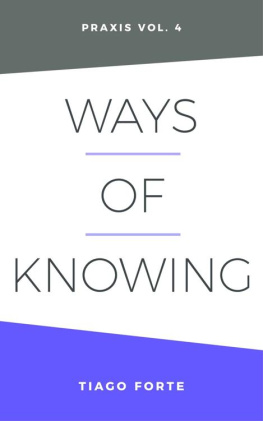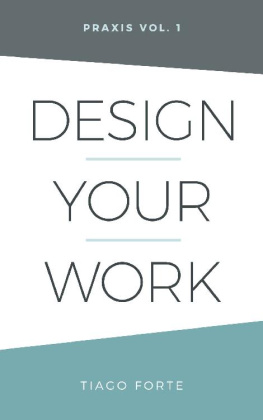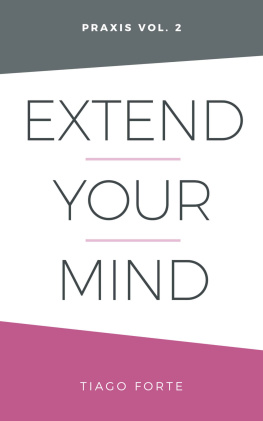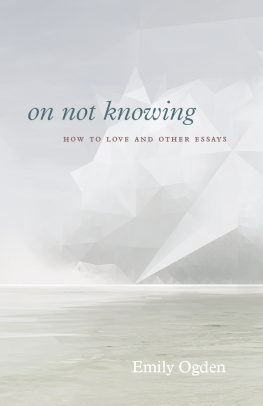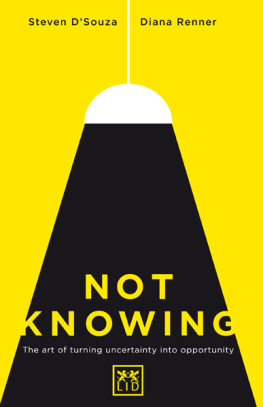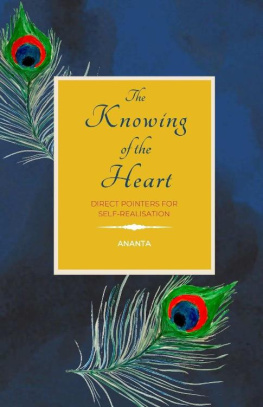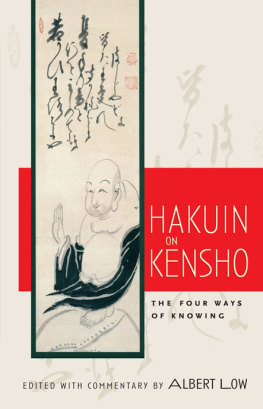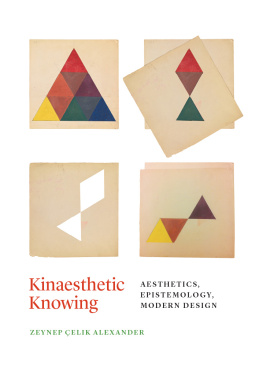I hope you one day get to experience all the ways of knowing that I have, and many more
Foreword
I am obsessed with the nature of knowledge what it is, where it comes from, how its created, and how to help people use it more effectively.
Years ago I set off on an intellectual pursuit to answer these questions. I studied the inner workings of the human brain, lessons from psychology and neuroscience, and the principles of information technology to try and understand what it means to know something . I documented that journey in my book Extend Your Mind .
But as I went deeper and deeper, I began to see that there was a completely different way of understanding knowledge, as I shared in The Heart is the Bottleneck . As embodied instead of dissociated, as intuitive instead of analytical, as somatic instead of cerebral.
I was slowly drawn to aspects of human experience that I was much less familiar with personal growth, emotional intelligence, and the relationship between mind and body. I discovered that so much of our most precious knowledge isnt stored in the form of facts and figures. It is stored inside the body and the heart as memories, instincts, traumas, and dreams.
Ways of Knowing weaves together these different ways of knowing Ive discovered, from head to heart to gut. It includes 14 in-depth essays previously published on my Praxis blog , which have been edited for clarity and updated for accuracy. The odd-numbered chapters trace my ongoing explorations of the logical side of human knowledge, while the even-numbered chapters focus on the emotional and intuitive side.
The mind and the body are deeply intertwined, and it is essential to understand both. The logical approach of the mind allows us to learn from others via facts and research, while the intuitive-emotional approach of the body allows us to learn via our own experience. Like the double helix of a DNA strand, these two sides of ourselves interact and reinforce each other to enable us to know things on many levels and in many ways.
Ive come to understand the heart and body as a vast, subterranean intelligence that extends far beyond anything we can consciously know. It draws on the unseen depths of our genetics, our ancestral history, our web of social relationships, and the natural environment we evolved in. The body is like an instrument panel with dozens of specialized sensors, taking in more kinds of data from more sources than we can imagine.
As we develop our self-awareness, we can begin to tap into this vast intelligence. It can guide us in making better decisions, letting go of beliefs that no longer serve us, and following the courage of our convictions. We can access it when we need to expand beyond our limited point of view, when a challenge demands more than we think we can give, or weve lost hope and need to be reminded that we are part of something bigger than ourselves.
It is an inexhaustible source of wisdom that is always available to us if we know how to reach down and access it.
My goal is to better understand the nature of knowledge by reuniting the mind and body that modern society so often treats as completely separate. To recruit every form of intelligence at our disposal to help us live better, happier, more fulfilling lives.
The odd-numbered chapters (focusing on the logical side of knowledge) include:
- Chapter 1 Commonplace Books: Creative Note-Taking Through History: The history of note-taking across cultures and around the world and what we can learn from it
- Chapter 3 A History of Information Revolutions : A framework for understanding information explosions of the past, including how to use them to our advantage
- Chapter 5 Building a Second Brain: An Overview : A summary and overview of the methodology for personal knowledge management Ive been developing for more than 10 years
- Chapter 7 The Story Behind Building a Second Brain : The story of how Building a Second Brain the method, the course, and the movement came to be
- Chapter 9 7 Trends Driving the Note-Taking Revolution : A survey of the most powerful trends driving worldwide interest in digital note-taking as a crucial skill for all knowledge workers
- Chapter 11 The Complete Guide to Tagging for Personal Knowledge Management : A how-to guide on incorporating tagging as part of your knowledge management system, based on the principles Ive discovered across different fields
- Chapter 13 The 10 Paradoxes of Entrepreneurship : My examination of the paradoxes that lie at the heart of entrepreneurship, or any other ambitious endeavor
Even-numbered chapters (on the emotional-intuitive side of knowledge) include:
- Chapter 2 How Emotions Are Made: The Theory of Constructed Emotion : The biological basis of the phenomena that govern our waking lives our emotions and how they work to both protect and limit us
- Chapter 4 The Body Keeps the Score: Brain, Mind, and Body in the Treatment of Trauma : A summary of the groundbreaking work on trauma by Dr. Bessel van der Kolk and what it can teach us about how our experiences are encoded in our nervous system
- Chapter 6 Tiago Fortes Origin Story : A short autobiography (so far), which I wrote to understand the events in my life that led me to where I am today
- Chapter 8 Pleasure as an Organizing Principle : My deep dive into how we can use pleasure as the organizing principle of our lives, as opposed to self-sacrifice
- Chapter 10 Servant Hedonism: My Life Philosophy : A declaration of my newly recognized life philosophy, combining self-service with service to others
- Chapter 12 What It Feels Like to Have a Second Brain : A personal description of how it feels to be in the flow of working with my Second Brain
- Chapter 14 Groundbreakers: My Journey Healing Trauma, Unleashing Anger, and Awakening the Vagus Nerve : The story of my journey of more than a decade as I struggled with an unexplained medical condition, which became my gateway to understanding my emotions and unlocking the potential of my unconscious mind
If youd like to receive my future writing as soon as it comes out, subscribe to my free weekly newsletter . Every week I send out expert interviews, thoughtful essays, how-to articles, and other useful resources to help you become more capable and fulfilled. And if you want full access to my most in-depth content, become a Praxis member .
Thank you for being part of this journey with me, and for trusting me to illuminate part of it for you.
Tiago Forte
Long Beach, CA
January 12, 2021
1 | Commonplace Books: Creative Note-Taking Through History
One of the clearest predecessors to the modern practice of knowledge management are commonplace books centralized, personally curated, and continuously maintained collections of information from various sources that rose to popularity during the Enlightenment and Industrial Revolution in Europe.
These books helped educated people cope with the information explosion unleashed by the printing press and industrialization. They were highly idiosyncratic, personalized texts used to make sense of a new world of intercontinental trade, long-distance communication, and mass media. Commonplace books could contain recipes, quotes, letters, poems, tables of weights and measures, proverbs, prayers, legal formulas, notes from sermons, and remedies for common maladies, among many other things.
Commonplacers would transcribe interesting or inspirational passages from their reading, assembling a personalized encyclopedia of quotations, ideas, anecdotes, observations and other information they came across. The purpose of the book could range from personal recollection and reflection, to source material for writing, speaking, politics, or business.

